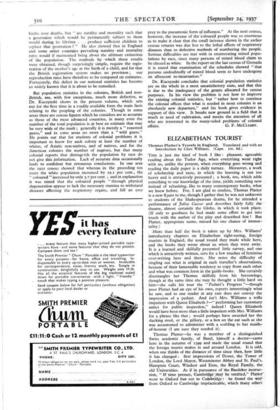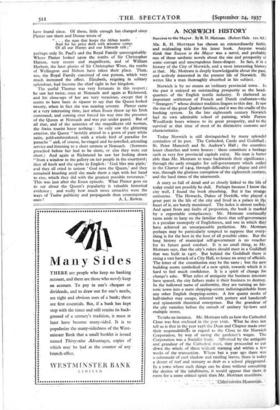ELIZABETHAN TOURIST
THIS is just the kind of book I like : pleasant, agreeable reading about the Tudor Age, when everything went right with us, unlike the present, when everything goes wrong and reading the daily paper is a daily torture. Moreover, a work of scholarship and taste, in which the learning is not too heavy and is attractively presented ; a book, too, which adds something to our knowledge of the time, yields something new instead of rehashing, like So many contemporary books, what we knew before. For, I am glad to confess, Thomas Platter is a new fi3ure to me, though I gather that he was not unknown to students of the Shakespearean drama, for he attended a performance of Julius Caesar and describes fairly fully the theatre, almost certainly the Globe, in which it took place. (If only to goodness he had made some effort to get into touch with the author of the play and described him ! But Platter, appropriate name, missed his one chance of immor- tality.)
More than half the book is taken up by Mrs. Williams' introductory chapters on Elizabethan sight-seeing, foreign tourists in England, the usual round they made while here, and the books they wrote about us when they went away. It is a learned and skilfully presented little survey, and one which is attractively written, save for a few touches of feminine over-writing here and there. She notes the difficulty of singling out what is original in each traveller's observations, because of their lamentable tendency to copy from each other and what was common form in the guide-books. She certainly disentangles her Thomas skilfully from his borrowings, though at the same time she may be thought a little hard on him—she calls his tour the " Pedant's Progress "—though poor Platter had an eye of his own, reports interestingly what he saw, and to one reader at any rate does not convey the impression of a pedant. And isn't Mrs. Williams a trifle impatient with Queen Elizabeth ?—" performing her customary antics for public inspection," indeed ! Queen Elizabeth would have been more than a little impatient with Mrs. Williams for a phrase like that ; would perhaps have awarded her the ducking stool, or the pillory, or .a box on the ear such as she was accustomed to administer with a scolding to her maids- of-honour (I am sure they needed it).
Thomas Platter—he was a member of a distinguished Swiss academic family, of Basel, himself a doctor—came here in the autumn of 1599 and made the usual round that the foreign tourist makes in and around London. It is odd, when one thinks of the distance of time since then, how little it has changed : first impressions of Dover, the Tower of London, the Lord Mayor, Westminster Abbey and St. Paul's, Hampton Court, Windsor and Eton, the Royal Family, the old Universities. As if in pursuance of the Baedeker instruc- tion, " If time presses, Cambridge* May be omitted," Platterr" went to Oxford bur not to Cambridge -: - he found the way' from Oxford to Cambridge impracticable, which Many others have found since. Of these, little enough has changed since Platter saw them and Donne wrote of
dt . the man that keeps the Abbey tombs And for his price doth with whoever comes Of all our Harrys and our Edwards talk ; "
perhaps only St. Paul's and the Royal Family unrecognisably. Where Platter looked upon the tombs of Sir Christopher Hatton, very recent and magnificent, and of William Herbert, the later glories of Sir Christopher Wren, the tombs of Wellington and Nelson have taken their place. Then, too, the Royal Family consisted of one person, which very much increased the effect. Elizabeth, reigning in solitary splendour, had become the chief sight in her kingdom.
The useful Thomas was very fortunate in this respect ; be saw her twice, once at Nonsuch and again at Richmond, and his close-ups of her are very veracious, except that it seems to have been de rigueur to say that the Queen looked twenty, when in fact she was nearing seventy. Platter came at a very interesting time, just when Essex threw up his Irish 'command, and coming over forced his way into the presence of the Queen at Nonsuch and was put under guard. But of all that, and of the anxieties of the magnificent old woman, the Swiss tourist knew nothing : he only saw the glittering exterior, the Queen " lavishly attired in a gown of pure white satin, gold-embroidered, with a whole bird of paradise for panache " and, of course, be-ringed and be-jewelled, attending service and listening to a short sermon at Nonsuch. (Sermons preached before her had to be short, or else they were cut short.) And again at Richmond he saw her looking down "from a window in the gallery on her people in the courtyard; they all knelt and she spoke in English : ' God bles mie piple,' and they all cried in unison ' God save the Queen,' and they remained kneeling until she made them a sign with her hand to rise, which they did with the greatest possible reverence." This was just after the Essex episode. What Platter goes on to say about the Queen's popularity is valuable historical evidence ; and really how much more attractive were the ways of Tudor publicity and propaganda than contemporary



















































 Previous page
Previous page